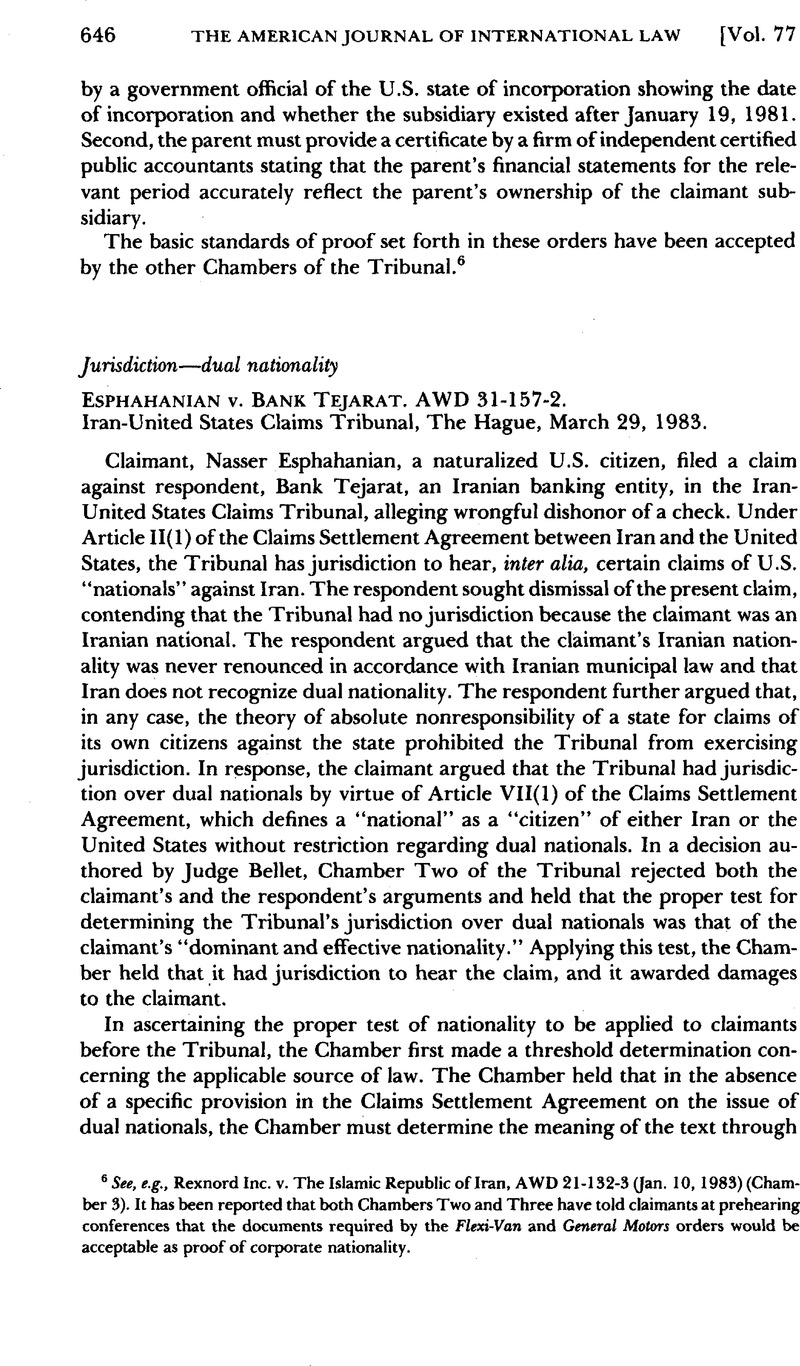No CrossRef data available.
Published online by Cambridge University Press: 27 February 2017

1 Both Iran and the United States have acknowledged before the Tribunal that international agreements between them, including the Claims Settlement Agreement, are to be interpreted in accordance with the rules embodied in the Vienna Convention on the Law of Treaties of May 23, 1969, reprinted in 63 AJIL 875 (1969), 8 ILM 679 (1969). See Memorials filed before the Tribunal on Nov. 23, 1981 in case A/1 by Iran (p. 22) and by the United States (p. 11).
2 179 LNTS 89.
3 Article 5 of the Hague Convention, supra note 2, states that “within a third State, a person having more than one nationality shall be treated as if he had only one” and that third states “may, in [their] territory, recognize exclusively amongst the nationalities possessed by such individual, either the nationality of the country in which he mainly and principally resides, or the nationality of the State to which, according to the circumstances, he appears to be more attached in fact” (quoted by Chamber Two).
4 Judge Bellet relied particularly on the Nottebohm Case (Liechtenstein v. Guat.), 1955 ICJ Rep. 4; and the Merge Case (U.S. v. Italy), 14 R. Int’l Arb. Awards 236 (1955).
5 Article 111(3) of the Claims Settlement Agreement states that “[cjlaims of nationals of the United States and Iran . . . shall be presented to the Tribunal either by claimants themselves, or, in the case of claims of less than $250,000, by the Government of such national.” In the latter case, Chamber Two noted, the Governments act only as counsel.
6 Article VII(3) and (4) of the Claims Settlement Agreement includes within the definition of Iran and the United States “any agency, instrumentality, or entity controlled” by either of the two Governments.
7 Article V of the Claims Settlement Agreement states: “The Tribunal shall decide all cases on the basis of respect for law, applying such choice of law rules and principles of commercial and international law as the Tribunal determines to be applicable. . . . “
8 Quoting the Nottebohm Case, 1955 ICJ Rep. at 22. To this conclusion, the Chamber added “an important caveat”: it reserved the right to deny jurisdiction to dual nationals on equitable grounds in cases of fraudulent use of nationality.
9 Article VI(4) of the Claims Settlement Agreement gives the Tribunal jurisdiction over “[a]ny question concerning the interpretation or application” of the Agreement “upon the request of either Iran or the United States.” Under Presidential Order No. 1 of Oct. 19, 1981, only the Full Tribunal has jurisdiction to hear cases arising under this paragraph. Under Article IV(1) of the Claims Settlement Agreement, all decisions and awards of the Tribunal are final and binding. Thus, the hearing scheduled for Oct. 6, 1983 before the Full Tribunal will not affect the award in Esphahanian, the value of which the claimant received in May 1983.